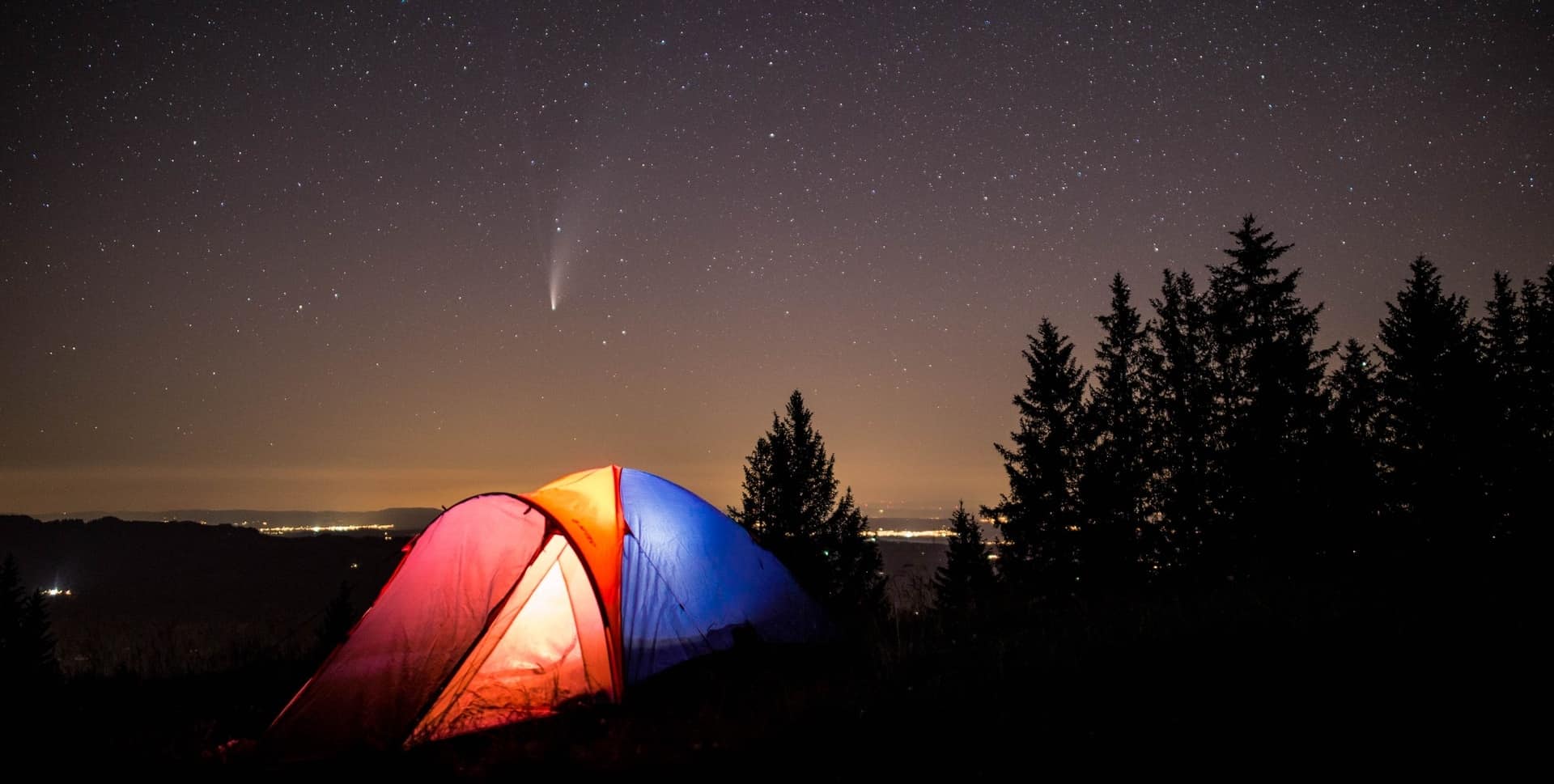Tent color is not just about the look of the tent. Tent colors can have a function as well as be beautiful to the beholder.
Dark tents are warmer. Light tents are cooler. Some colors attract critters. In some situations, it’s best to be seen. In others, being unseen might keep you safer.
So does tent color matter? Don’t be fooled by pretty colors. Choose a color that is going to be the best in your camping situation because believe it or not, tent color can matter! Read on to find out more!
Related: Looking for a tent that will keep you cool on a warm day? Check out our reviews of the best summer tent for hot weather.
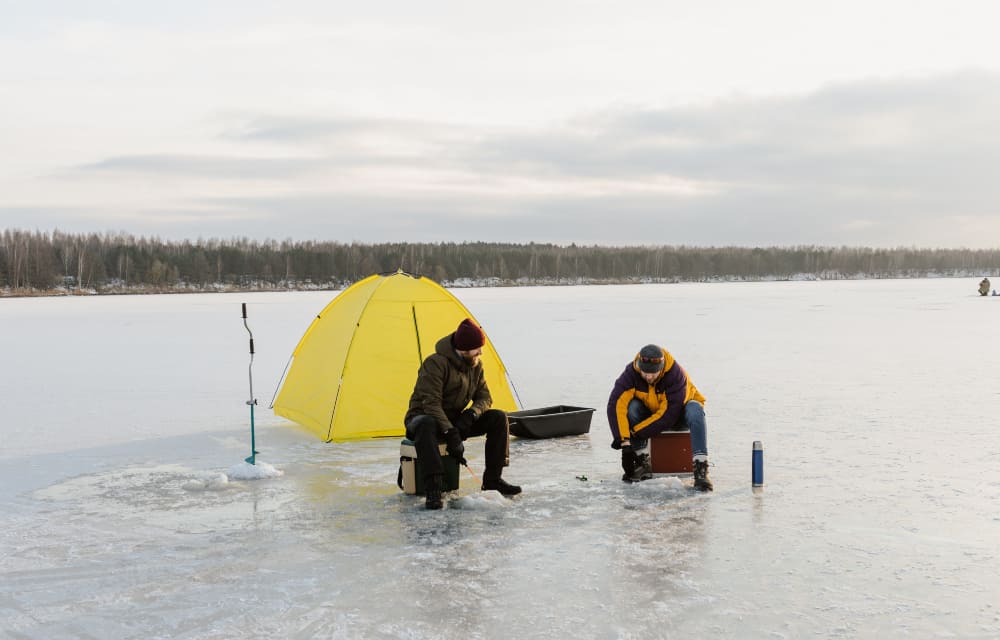
Stay happy – in a bright-colored tent!
When the weather turns bad and you are stuck in a tent for longer than you want, a light colored tent needs less lighting resources than a dark colored one and basic color therapy tells that bright colors make people feel happier!
| Color | Mood | Good for… | Bad for… |
| 🐞 Red | Passion, faster metabolism | Safety, heating the tent, Winter, photos! | Hot days |
| 🍁Orange | Sense of welcoming, energy | Safety, emergency, good hunting tent, Summer, photos! | Hiding |
| ☀️ Yellow | Happiness, positivity | Easy to find, safety, Summer, Instagram, positive vibes | Beaches |
| 🌳 Green | Harmony, stability | Blending in | Hunting areas, seagulls, staying inside |
| 💧 Blue | Peace, relaxation | Beaches | Standing out |
| ☂️ Purple | Luxury, romance | Glamping, standing out | Staying inside |
| 🌚 Black | Power, elegance | Heating up the tent with the sun, Sleeping in, Winter | Finding in the dark, mosquitos, staying inside |
| ☁️ White | Simplicity, purity | Heat reflection, Summer | Beaches |
| 🐿️ Brown | Friendliness, dependability | Deserts, camouflage, blending in, Winter | Finding in the dark, hunting areas, mosquitos |
Do darker tents get warmer in the sun?
Yes, is the short answer as dark colors such as black, brown, dark green, blue and purple colors are great at absorbing heat and poor at reflecting light.
These colors are great to pitch in winter, however, as they will heat up during the day and retain some of that heat into the evening allowing you are naturally warmer environment to get ready for sleep in.
Dark colored tents make it easier to get a good night’s sleep if you are sensitive to light. A dark tent color is harder for people and animals passing by to see in the dark. Often that will make you feel safer.
Sleeping in dark color and blackout tents
Blackout tents are designed to ensure very little light gets into the tent so you don’t have to wake up when the sun does! Great for people sensitive to light or with young children or babies.
Also very advantageous to people who are stargazing or carrying on nocturnal activities that might have them wanting to sleep well after sunrise…
Blackout tents are usually cooler first things in the morning as they are darker and usually made of thicker material.
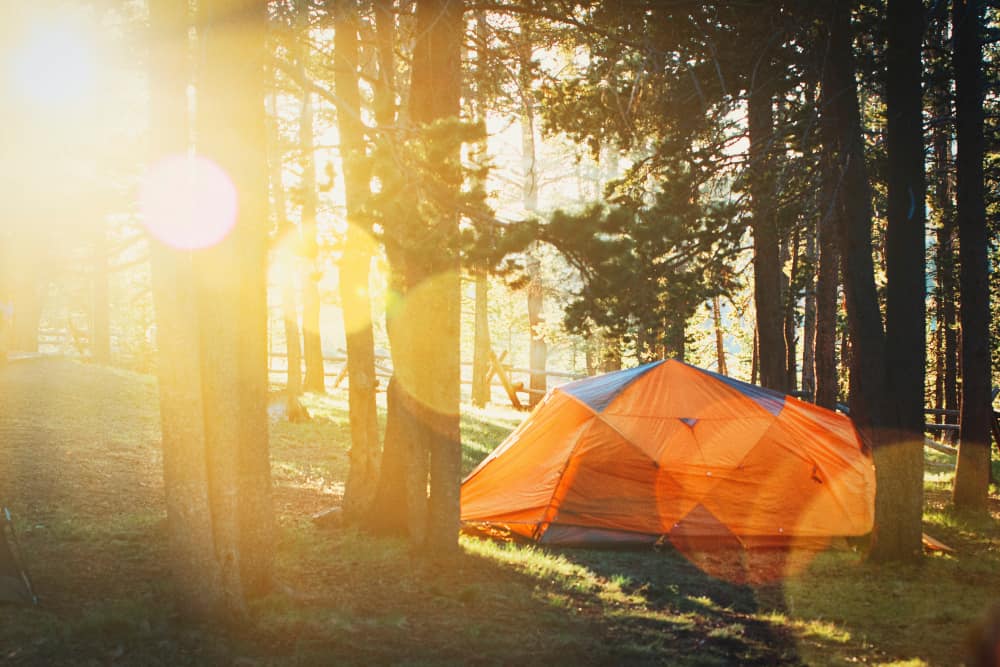
It’s easier to find a bright tent color in a campsite
You’ll find your bright pink or orange color tent in crowded campgrounds far easier than a dull color tent that may look like a shadow. Of course, everyone will have the same idea so maybe use a flag raised on a pole to flag where your tent is!
It’s easier to see a bright tent color from a distance too if you happen to be the only people for miles and miles around. A camouflage color tent in unfamiliar surroundings can lead to some stress and anxiety until you get your bearings and find it again!
And bright tent colours keep you happier
Something that is rarely mentioned is that bright colored tents keep you happier than dark tents. When it’s pouring outside and you just want to stay inside your tent, a bright tent color will let in plenty of sunlight. Dark tents, and particularly green tents, can start making you feel a little low after a while.
Are mosquitos and bugs more attracted to some tent colors?
Yes – Mosquitos especially like the darker colored tents!
Bugs and insects are also attracted to lighter-colored tents in general especially at night when they are lit from within. Mesh doors and windows are your best defense against bitey night creatures.
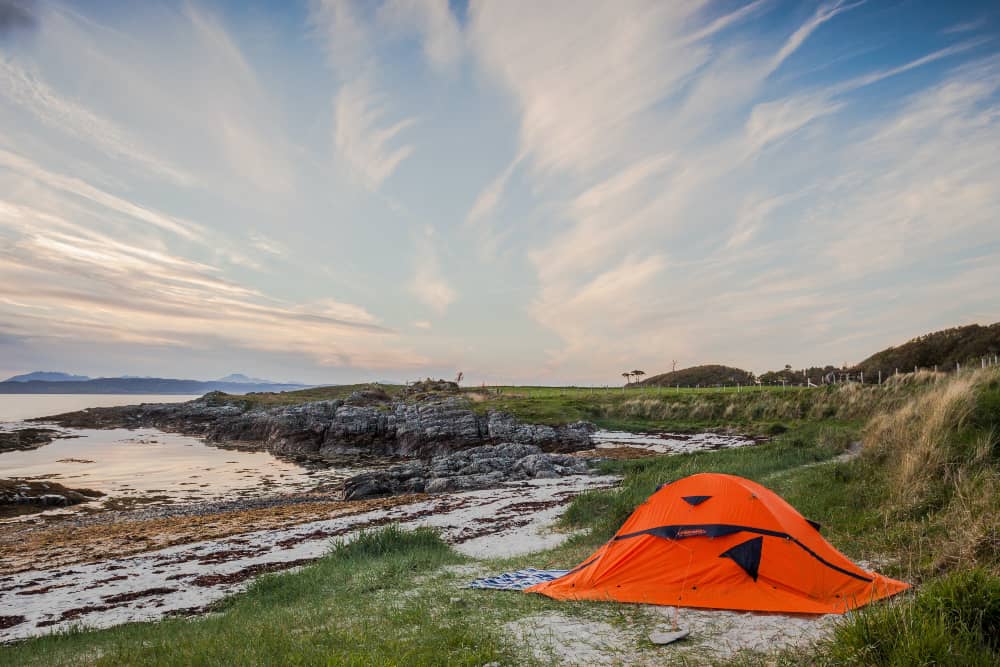
Beach camping: Which tent colors prevent UV rays?
Darker colors can block UV radiation but make your tent quite hot. Blue is the best color for blocking these dangerous rays.
Light colors like white and yellow reflect the light and don’t absorb heat which keeps them cooler but they do let UV rays through and so offer the least protection.
If you are camping at the beach, look for as much shade as you can to stop the UV rays from damaging your tent’s fabric.
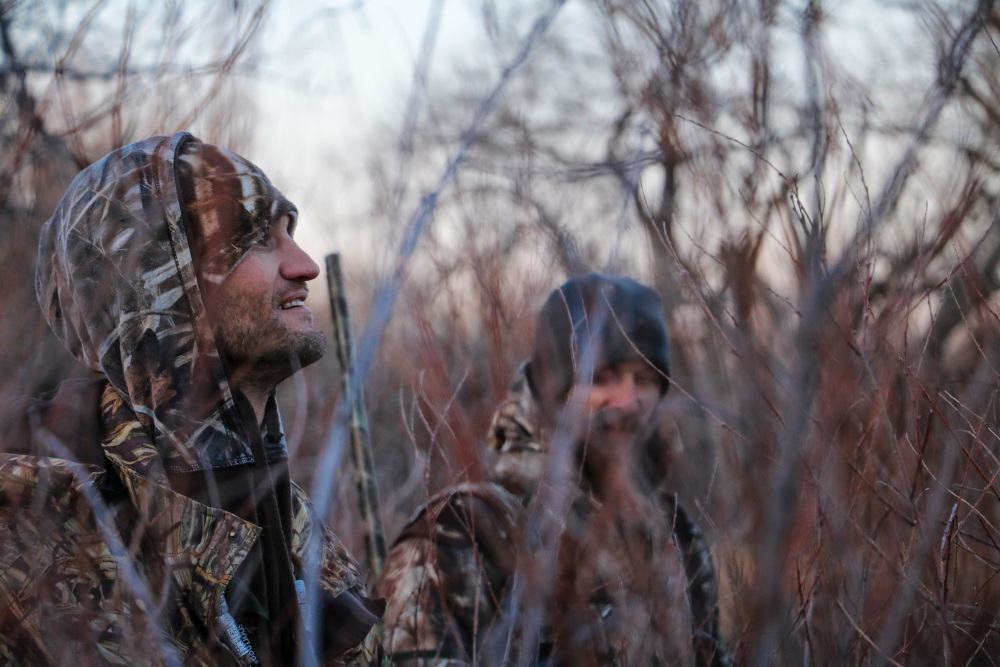
Don’t let your tent become a hunter’s target
Camping in an area that is open for the hunting season isn’t the best thing to do but having a bright orange tent is going to allow the hunters to spot the tent much sooner and not mistake it for anything else.
Don’t camp in hunting areas with camouflage tent colors or ones that blend into the scenery. You want to be as visible as possible when camping in an area where people are walking around with loaded guns!
Best color for getting rescued and staying safe
From a safety point of view, a bright-colored tent can be used as an emergency beacon whether it’s pitched or you are waving it to a medical chopper from the ground.
If you are camping away from the beaten track, bright-colored tents will help you find your way back to the tent in unfamiliar territory too! Backpacking and hiking tents are often bright colors for this reason.
White tents seem like a great idea for all the reasons above except that some wild animals, like our big cats and bears, seem to find white and very light colors attractive and sometimes, come to investigate. Check to see if this is a possibility before you set up camp in a nice white shiny tent!
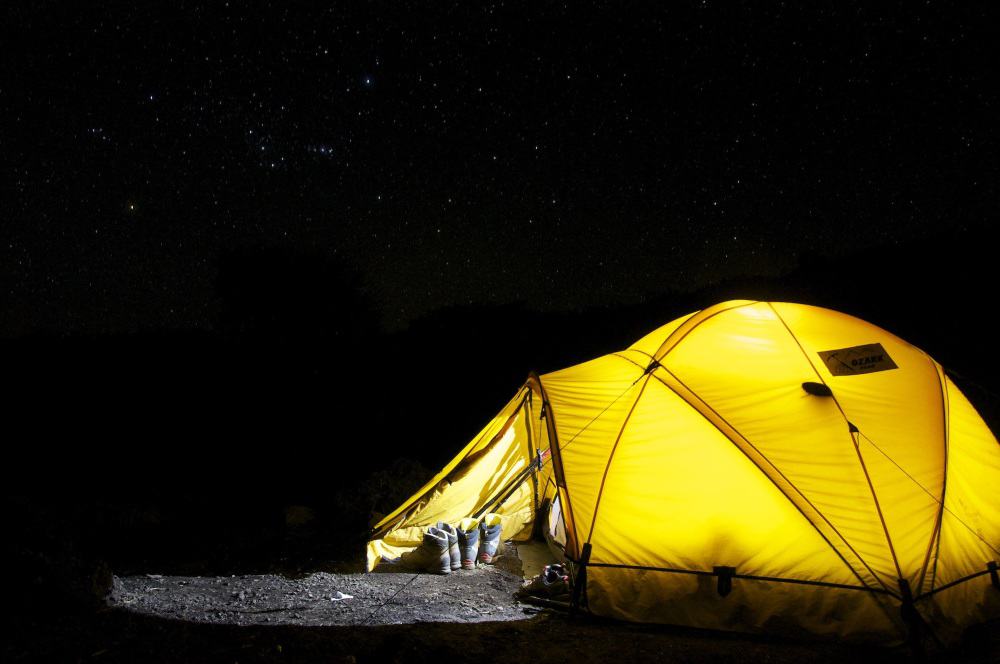
Use a heat-reflecting blanket to cool any colored tent
No matter what color your tent is if it’s too hot inside, then getting a heat-reflecting blanket and placing it shiny side up on your tent will reflect a lot of sun and keep it cooler inside.
The downside of shiny tents is that it attracts seagulls (as do green tents). Shiny things can also attract curious bears, cats, and some birds, just because of their attention-getting sparkle and shine.
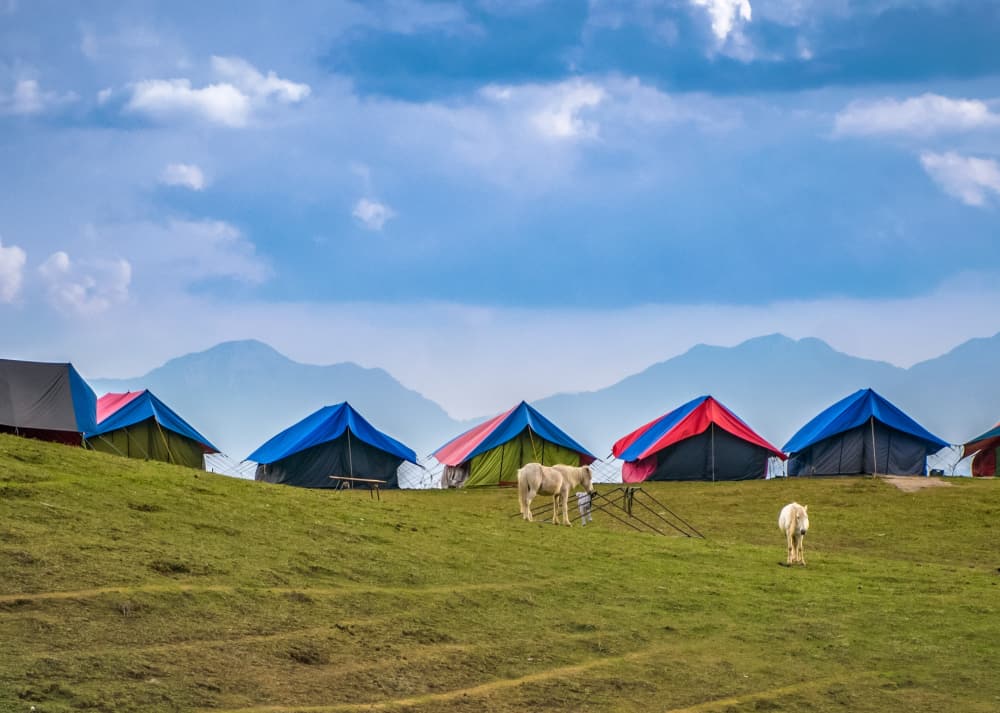
Want to change the color of your tent?
You can buy paints and dyes to change the color of your camping tent but the simplest way to change the color is to buy a new fly! Get one in the color you need or the color you love and always enjoy looking at your tent!
The reality is that the tent of your dreams is going to come in a small range of colors. Unless you are going camping near a hunting area or off into the uninhabited wilds, most colors will cope with most situations with small workarounds like a heat-reflecting blanket, camping in the shade, or a different colored fly.
Unless you think you could be in danger and need rescuers to see you and your tent, pick the color that makes you happy when you look at it. That’s what camping is all about – being happy and enjoying yourself!
FAQ
What is the best color for a tent?
The best color for a tent really depends on personal preference and what you are using the tent for. Some people prefer lighter colors like white or beige because they provide a bright, airy atmosphere inside the tent. Darker colors like green or brown can help blend in with the surroundings and offer a more natural look. Ultimately, the best color for your tent is the one that you like and that meets your specific needs and preferences.
What color tent is best for bugs?
Bugs and insects are attracted to lighter-colored tents, especially at night when they are lit from within. If you want to keep those creepy crawlies at bay, opt for a darker-colored tent or make sure your tent has mesh doors and windows to keep them out.
What color tent is best for sun protection?
When it comes to sun protection, darker colors are your best bet. Darker colors like blue can block UV radiation and keep your tent cooler. On the other hand, lighter colors like white and yellow reflect light but don’t block UV rays, so they offer the least protection. If you’re camping at the beach, make sure you find a spot with plenty of shade to protect your tent from UV damage.
Wrapping up on tent colors
In conclusion, the color of your tent can have a significant impact on your camping experience. From providing comfort in hot or cold weather to attracting or repelling insects and critters, the color of your tent is an important factor to consider.
From light colors like white and yellow that reflect light and stay cooler, to darker colors like black that absorb heat and offer privacy, each color has its own benefits and drawbacks. So, choose wisely and pick a color that will serve you best in your particular camping situation.
Remember, don’t be swayed by aesthetics alone, function and comfort should be at the forefront of your decision.
Happy Camping! 😊
Next up: If you’re going camping on a warm day, find out how to cool a tent.
Go back one: Fancy a lightweight tent you can built out of a trekking pole and a tarp? Find out what a pyramid tent is and if they’re good.
